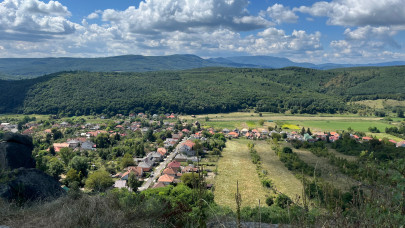Giving details on the brand's outlook to 6,000 visitors at the company's Vision of the Future event in Beauvais, France, Thierry Lhotte, Vice President Marketing, Massey Ferguson Europe/Africa/Middle East remarked: “To produce more from less, bio- and agri-technology will need to work together to achieve the necessary increases in food production to feed the world's growing population. At the same time, farmers will need to strike a balance between a profitable business and a sustainable environment. Farm machinery must deliver a good return on their investment.”
He explained that in order to boost production, the three key challenges for farmers were the soil; environment and sustainability; and information and integration. A further major issue was the pressing need to encourage young people into agriculture.
Thierry Lhotte, Vice President of Marketing for Massey
Ferguson EAME, conference at Vision of the Future 2014
“Soil is a key asset. It has to sustain crop growth, support larger loads to enable mechanisation, and permit infiltration and storage of water. In order to preserve soil and tackle the problems of compaction, erosion, water and nutrient management, a farmer will need to be more of an agronomist than ever before,” said Thierry.
“On the subject of environment and sustainability, the important areas are selection of the correct seed varieties, detailed land surveying and the optimum use of fertiliser which must come from the right source and be applied at the right rate, at the right time in the right place,” he continued.
“The entire food chain - from production to distribution - will benefit from increased information and integration. Collection and analysis of data from the field, for example, are crucial to develop optimum crop strategies and make the most of available land.”
Thierry Lhotte, Vice President of Marketing for Massey
Ferguson EAME, conference at Vision of the Future 2014
“The entry of young people into farming is essential for agricultural security and must be encouraged,” Thierry emphasised. “The percentage of farms operated by under 35- year-olds in the EU is just 6%. Research has shown that farmers under 35 are one third more productive than their older counterparts.”
He then went on to give an insight into farm equipment developments of the future. “While power will continue to increase, ever-bigger monster machines are not the only solution,” he remarked. “Tractors below 100hp still account for 90% of the market in Africa and Middle East, 75% in Russia and just over half in Europe. The new farmer generation will continue to rely on these machines as all-round workhorses.”
“At Massey Ferguson, our aim is to produce dependable machines with broad appeal across all farm types. While they are straightforward, these machines are also smart – employing the most appropriate mechanisation and technology to suit a huge diversity of needs,” he said.
“Worldwide, the major trends are for modular and versatile machines, more comfort, ease-of-use and low cost of ownership. For emerging markets, the key issues are ease-of-use and repair, automation and connectivity, fuel efficiency and the requirement for engines to be less sensitive to fuel quality.”
Looking further ahead, Thierry revealed some exciting ideas that could develop into the tractors of the future such as modular units with ‘add-on' power units which could be used elsewhere on the farm for electricity supply. He also showed examples of tool carriers, master/slave concepts, hybrid/hydrogen engines, four-wheel-steer and an immersive cab.
“At Massey Ferguson, we don't believe in technology simply for technology's sake. Machinery is a big outlay and any engineering developments must provide farmers with a good return on their investment and help boost efficiency,” he said. “We will continue to stay close to our customers, listen to their ideas and ensure that our solutions are consistent with their expectations for farming in the real world.”
Thierry Lhotte, Vice President of Marketing for Massey
Ferguson EAME, conference at Vision of the Future 2014







